Every week, there seems to be another story about the health benefits of running. That’s great—but what if you can’t run? For the elderly, obese or otherwise mobility-limited, the rewards of aerobic exercise have long been out of reach. Co–senior authors Ronald Evans and Michael Downes, together with first author Weiwei Fan and colleagues, have built on earlier work by the lab that identified a gene pathway (PPARD) triggered by running. In the current study, which appeared in Cell Metabolism on May 2, 2017, the team reported fully activating that pathway in sedentary mice with a chemical compound, mimicking the beneficial effects of exercise. They also found that PPARD encourages fat-burning but suppresses sugar-burning in muscles during exercise, likely to preserve sugar for use by the brain. The work reveals why runners who “hit the wall” experience both physical and mental exhaustion upon using up their ready supply of glucose.
“Exercise-in-a-pill” boosts athletic endurance by 70 percent
Featured Stories
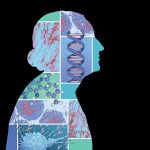 Interaction + Infrastructure = Innovations in Healthy AgingSalk formula recalculates aging research, shifting focus to overall resilience and health span.
Interaction + Infrastructure = Innovations in Healthy AgingSalk formula recalculates aging research, shifting focus to overall resilience and health span. Professor Jan Karlseder named Salk’s Chief Science OfficerOn February 1, Jan Karlseder started as Salk’s new senior vice president and chief science officer (CSO).
Professor Jan Karlseder named Salk’s Chief Science OfficerOn February 1, Jan Karlseder started as Salk’s new senior vice president and chief science officer (CSO). 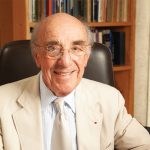 Salk mourns the loss of Nobel Laureate Roger GuilleminThe Institute remembers the “father of neuroendocrinology” for his many contributions to science and friendship to all.
Salk mourns the loss of Nobel Laureate Roger GuilleminThe Institute remembers the “father of neuroendocrinology” for his many contributions to science and friendship to all.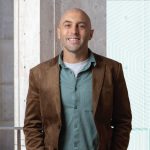 Daniel Hollern–Turning a cancer diagnosis into a career in basic researchAssistant Professor Daniel Hollern pivoted his career trajectory after a family member’s life-changing diagnosis pushed his already-curious mind off a cliff of questions—starting with, “What can I do to help him?”
Daniel Hollern–Turning a cancer diagnosis into a career in basic researchAssistant Professor Daniel Hollern pivoted his career trajectory after a family member’s life-changing diagnosis pushed his already-curious mind off a cliff of questions—starting with, “What can I do to help him?” Jerry Sheehan–Collaborating shoulder to shoulder with scientistsWhen you think about a person who heads an information technology department, you might not envision them working shoulder to shoulder with research scientists. But that’s exactly the approach Jerry Sheehan is taking as Salk’s new chief information officer (CIO).
Jerry Sheehan–Collaborating shoulder to shoulder with scientistsWhen you think about a person who heads an information technology department, you might not envision them working shoulder to shoulder with research scientists. But that’s exactly the approach Jerry Sheehan is taking as Salk’s new chief information officer (CIO).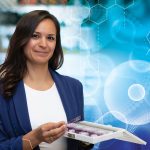 Laura Mainz–Taking control after a cancer diagnosisLaura Mainz grew up in a tiny village in midwestern Germany, with just as many cows as people. But the sweeping landscape speckled with farms never swayed her toward plant biology—instead, her interest in the human body grew.
Laura Mainz–Taking control after a cancer diagnosisLaura Mainz grew up in a tiny village in midwestern Germany, with just as many cows as people. But the sweeping landscape speckled with farms never swayed her toward plant biology—instead, her interest in the human body grew.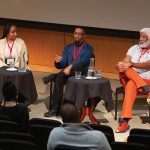 Black Association affinity group cultivates welcoming environmentThe Black Association at Salk (BAS) was one of the first affinity groups formed at Salk in 2020. Since that time, it has established itself as a welcoming space and go-to for resources for all Black Salk community members.
Black Association affinity group cultivates welcoming environmentThe Black Association at Salk (BAS) was one of the first affinity groups formed at Salk in 2020. Since that time, it has established itself as a welcoming space and go-to for resources for all Black Salk community members.
Support a legacy where cures begin.
Scientific discovery at the Salk Institute is made possible through your annual contributions. Your support will accelerate the pace of breakthroughs in understanding disease and pave the way to new drug therapies.
Get involved



















































